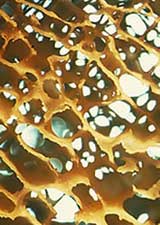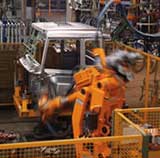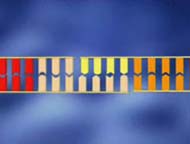
An immune system chemical may undo skin damage by sunlight.
A chemical involved in immune-system signalling may be able to reverse some types of skin damage caused by sunlight. It could reduce sunburn by activating DNA-repair mechanisms, a new study suggests, raising the possibility that the chemical might be used to prevent or treat skin cancer 1 .
High-energy ultraviolet light is thought to promote skin cancer by damaging the DNA within cells. Skin cancer,

Programmed molecules build themselves into a bone-mimic.
Scientists in the United States have made self-assembling synthetic bone 1 . Carefully designed building-blocks join up to mimic bone’s complex molecular-scale architecture, bringing better prosthetics a step closer.
Materials engineers are keen to emulate the strength and toughness of biominerals such as bone, tooth and shell. Mollusc shells, for example, a composite of the mineral calcium carbonate a

While prion diseases seem to be waning in humans, they could be waxing in sheep.
Variant Creutzfeldt-Jakob disease (vCJD) may claim only around 200 victims, a new model predicts 1 . This degenerative brain disease is thought to occur when people are exposed to misfolded prion proteins from meat infected with bovine spongiform encephalopathy (BSE or ’mad cow disease’).
Meanwhile, another study warns that a huge BSE epidemic could be brewing in the UK

Talk about multi-tasking. A new study reveals that in the St. John’s Wort plant, Hypericum calycinum, the same chemical not only attracts pollinating insects but also deters herbivores that pose a threat to its survival. The findings appear in the current issue of the Proceedings of the National Academy of Sciences.
To the human eye, the flowers of H. calycinum appear as uniform yellow disks (top image). Insects with ultraviolet-sensitive eyes, however, see a dark, ultraviolet-absorbing ce

The secret of a steady hand is tightening the right muscles.
Controlling the stiffness of some of our muscles lets us manage tricky feats of manipulation, such as keeping a screwdriver in a screw, researchers have found 1 . We tune the stiffness to oppose motions in the direction of instability, such as the sideways slips that would let the screwdriver slide out of the slot.
Although demanding on the brain, this is the most energy-efficient strategy, say Mitsu

Devices with DNA software may one day be fitted into cells.
“If you wear the right glasses, a lot of what you see inside the cell is computation,” says Ehud Shapiro of the Weizmann Institute in Rehovot, Israel. Now Shapiro and his colleagues have turned the computational power of biological molecules to their own ends 1 .
The researchers have built a machine that solves mathematical problems using DNA as software and enzymes as hardware. A trillion such biomol

– new calculation confirms standard model of particle physics. Contribution of hadronic vacuum polarization determined with unprecedented accuracy. The magnetic moment of the muon is an important precision parameter for…
Technique may prevent formation of unwanted waves that siphon off needed energy. Heating plasma to the ultra-high temperatures needed for fusion reactions requires more than turning the dial on a…

An international team of astronomers, led by researchers from the Astronomical Observatory of the University of Warsaw, have identified a new class of cosmic X-ray sources. The findings have been…

Antibody that Neutralizes Inhibitory Factors Involved in Nerve Regeneration Leads to Enhanced Motor Function after Acute Spinal Cord Injury. Researchers at 13 clinics in Germany, Switzerland, the Czech Republic and…

How the body’s natural killer cells could fight leukemia. Every year, some 13,000 people in Germany are diagnosed with leukemia. Despite intensive chemotherapy, around one in two of them die….

… eco-friendly reactor converts air and water into ammonia. Producing enough ammonia to feed the world comes with a large carbon footprint;. process described in new UB-led study could help…

How simulations help manufacturing of modern displays. Modern materials must be recyclable and sustainable. Consumer electronics is no exception, with organic light-emitting diodes (OLEDs) taking over modern televisions and portable…

“Neurons that fire together, wire together” describes the neural plasticity seen in human brains, but neurons grown in a dish don’t seem to follow these rules. Neurons that are cultured…

The quest for sustainable energy solutions has been a major focus of scientific research for decades. Solar energy, a clean and renewable source, has emerged as a promising alternative to…

With a processing speed a billion times faster than nature, chip-based laser neuron could help advance AI tasks such as pattern recognition and sequence prediction. Researchers have developed a laser-based…

New technology could remotely identify various types of plastics, offering a valuable tool for future monitoring and analysis of oceanic plastic pollution. Researchers have developed a new hyperspectral Raman imaging…

Artificial Intelligence (AI) has established a strong presence across industries, large and small. The “VoBaKI” research project has empowered small and medium-sized enterprises (SMEs) with an innovative tool to independently…